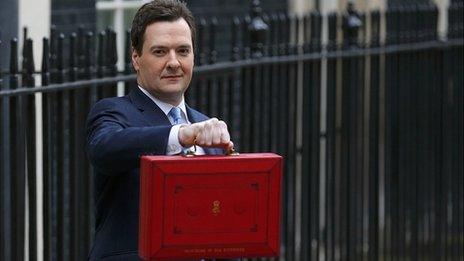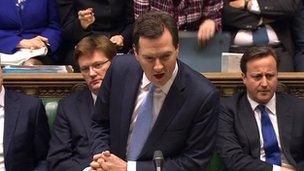Budget analysis: No sunshine on the horizon yet
- Published

"I am going to level with people."
Think about when and where you have heard that sentence before. It is the kind of language that is meant to act as a rhetorical waterproof to prepare you for something of a downpour.
In short, in what followed - in the numbers with lots of noughts on the end and percentages rarely lacking a decimal point - was an economic forecast that was less than sunny for the years ahead.
It will be overcast for a while longer yet.
The Office for Budget Responsibility (OBR), set up by the chancellor to be an economic forecaster independent of government, reduced its prediction for growth for 2013 significantly, to 0.6%.
So the prediction for growth has been cut, and the prediction for debt has grown.
The government, the OBR predicts, will borrow £114bn this year, up from the previous forecast of £108bn.
Housing help
The forecaster added that national debt is now not expected to peak until 2016-17 and government attempts to get the deficit down, arguably the government's single biggest objective, have stalled.
After last year's Budget, which generated less than helpful headlines for the government for months afterwards, Conservative MPs were praying for something reassuringly boring this time around.
One MP suggested to me, only half jokingly, a single sentence would do, rather than an hour's oratory: "We're sticking to our plan, and I commend this Budget to the House."
In big picture terms, and with 59 and a bit minutes more detail, that is what we got from the chancellor.
But a few other measures are worth a bit of attention.
Firstly, housing. Doing something, anything, which might help revive the flagging construction industry makes sense for the Treasury and they are having another go.
There are two blockages that stand in the way for many people who want to buy a house. Firstly, the issue of having enough savings to stump up a deposit. And secondly, having enough income to pay a mortgage.
The hope is the so-called help to buy scheme, whose very name echoes the Thatcher government's "right to buy" council houses, can help.
Taxpayers' money will be spent to help with deposits, the government's balance sheet will be used to guarantee mortgages and so, the theory goes, reassure nervy banks. This is a potentially expensive plan for the Treasury.
But there is still an unanswered question: helping to remove these blockages in the housing market might be necessary to tempt people to buy, but will it be sufficient with all the economic gloom about?
Beer and petrol
George Osborne's announcement on National Insurance is also significant. The new Employment Allowance will take the first £2,000 off the employer National Insurance bill of every company in the country.
It is thought around 450,000 small businesses, or one third of all employers, will pay no employer National Insurance at all after the introduction of Employment Allowance in April 2014.
There were cheers from Conservative and, in particular, Liberal Democrat MPs, when the chancellor announced that the annual threshold at which people start paying income tax would rise to £10,000 a year earlier than expected, in 2014.

George Osborne will be hoping this Budget is less exciting for headline writers than last year's
This is a flagship Liberal Democrat policy and it was striking that the Deputy Prime Minister and Lib Dem leader Nick Clegg looked around and smiled at his MPs, some bruised by the realities of coalition, as Mr Osborne spelt out this detail.
No analysis of a Budget is complete without reference to beer and petrol, particularly at a time when the cost of living is such a big deal for so many people, and so such a big deal for political parties.
The 3p a litre rise in petrol duty which was due to kick in in the autumn has been scrapped. So too has a planned 3p rise in beer duty. It has been replaced by a 1p cut on a pint of beer.
Cue cheers in pubs across the country. But it is a move worth keeping an eye on. The Wine and Spirit Trade Association has suggested scrapping the extra tax on beer while keeping it on other alcoholic drinks may be illegal under European law, because it distorts the free market.
But a European Commission spokeswoman told the BBC that EU rules lay down the minimum rates of excise duties on alcoholic beverages that countries must respect.
"Wine, beer and spirits are different products so these are subject to different rates. As long as the UK respects the minimum rates set in the EU Directive on excise duties and does not discriminate against imported products, the UK authorities can set the rate at the level they deem appropriate," the spokeswoman said.
'Downgraded chancellor'
So in practice, it would appear this means George Osborne can apply different levels of excise duty on alcoholic drinks as long as he respects the minimum rate.
And whilst it won't excite headline writers today, the long term economic implications of a change in the role of the Bank of England could prove significant.
The Monetary Policy Committee, which sets interest rates, has been given an updated remit, but, in theory at least, still has a target of keeping inflation below 2%. It's the first overhaul in its role for more than a decade and gives you a sense of the confidence the government has in the soon to be new Bank of England governor, Mark Carney, who takes over in a few months.
So how has all of this gone down? That, ultimately, is a judgement for you. But, if my email inbox is anything to go by, there are plenty of people willing to tempt you that it is good, bad, indifferent and every view in-between.
Both the government and the opposition know the next election will be won and lost on the issue of economic credibility, or a lack of it.
So, it was perhaps no surprise that the Labour leader Ed Miliband, whose tone and energy suggested he had put plenty of sugar on his breakfast, went for the big picture.
"Today, the chancellor joined Twitter," Mr Miliband said, with delight. "He could have got it all into 140 characters: Growth down, borrowing up, families hit, and millionaires laughing all the way to the bank. Hashtag downgraded chancellor."
Plenty more analysis and reaction will follow. But George Osborne will hope that after so much of his third Budget unravelled in the weeks after he'd delivered it, this one is much less exciting for the headline writers once the next few days are out of the way.